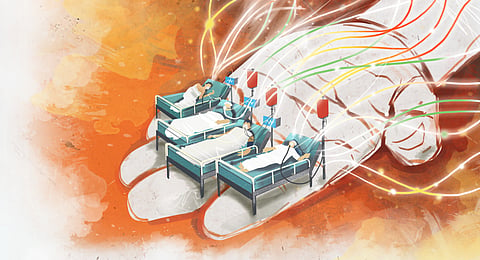

NEW DELHI: The Supreme Court on Friday sought responses from the Union of India (UOI), Directorate General of Health Services and states, after hearing a PIL seeking a direction that only registered medical institutions be allowed to engage in the removal, storage or transplantation of human organs and tissues.
A two-judge bench of the Apex Court, led by Justice Surya Kant and also comprising Justice KV Viswanathan, was hearing the PIL filed by Gaveshna: Maanvotthan Paryavaran Evam Swasthya Jaagrookata Samiti, seeking appropriate directions and or orders in the issue.
Former Additional Solicitor General (ASG) and senior advocate Vikas Singh, appearing for the PIL petitioner, said that there was an urgent need to ensure that government or semi-government medical institutions must be registered with the National Organ and Tissue Transplant Organization (NOTTO) for undertaking transplantation of human organs and tissues.
"While in India, over the years living donors had been the primary source of kidneys for transplantation, the last decade and a half has seen live donors being the main source of livers also. However, there is a need to reverse this trend," the petition further said.
It further said that almost 1,60,000 fatal road traffic accidental (RTA) deaths happen in India and almost 60% have associated head injury (almost 90 per million possible brain deaths from RTA). A large number of organs from these patients could be harvested for transplantation.
The number of persons donating organs after death in India is less than one per million population which is almost similar to some Asian countries like Japan, but far less than most Western countries. In 2020, the United States and Spain had the highest rates of deceased Organ donors in select OECD countries with almost 38 people per million population, the plea further said.
Surprisingly, according to a survey in 2018 about people's willingness to donate organs after death Colombia and India with 75 and 74 per cent respectively had the highest per cent of willing people to donate organs after death, ahead of Spain (72%), UK (67%) and Germany (53%). This may be due to the campaigns undertaken by non-government organisations in the country. Mass media, religious and political leaders may be involved to maximize awareness about Organ donation, the plea further said.
The fundamental rights, particularly the Right to life with dignity which is enshrined under Article 21, can be achieved by setting up the facilities of organ donation and tissue retrieval centres in all Government and Semi-Government Medical Colleges/ hospitals, it said.
The demand for organ retrieval is increasing periodically and due to the dearth of infrastructure in such medical institutions, innumerable people are losing their lives and the ones coming forward to donate their organs are facing hardships. Further, the Right to Life means a healthy and dignified life, which has been duly recognized by this Court in its numerous verdicts, the plea said.